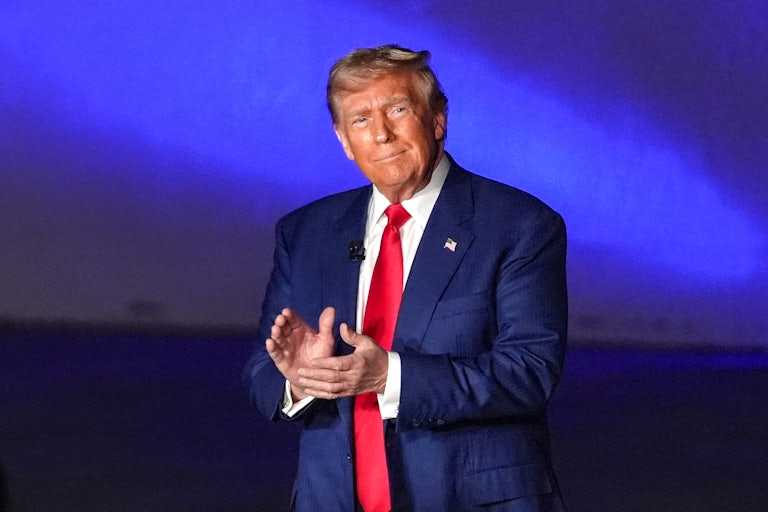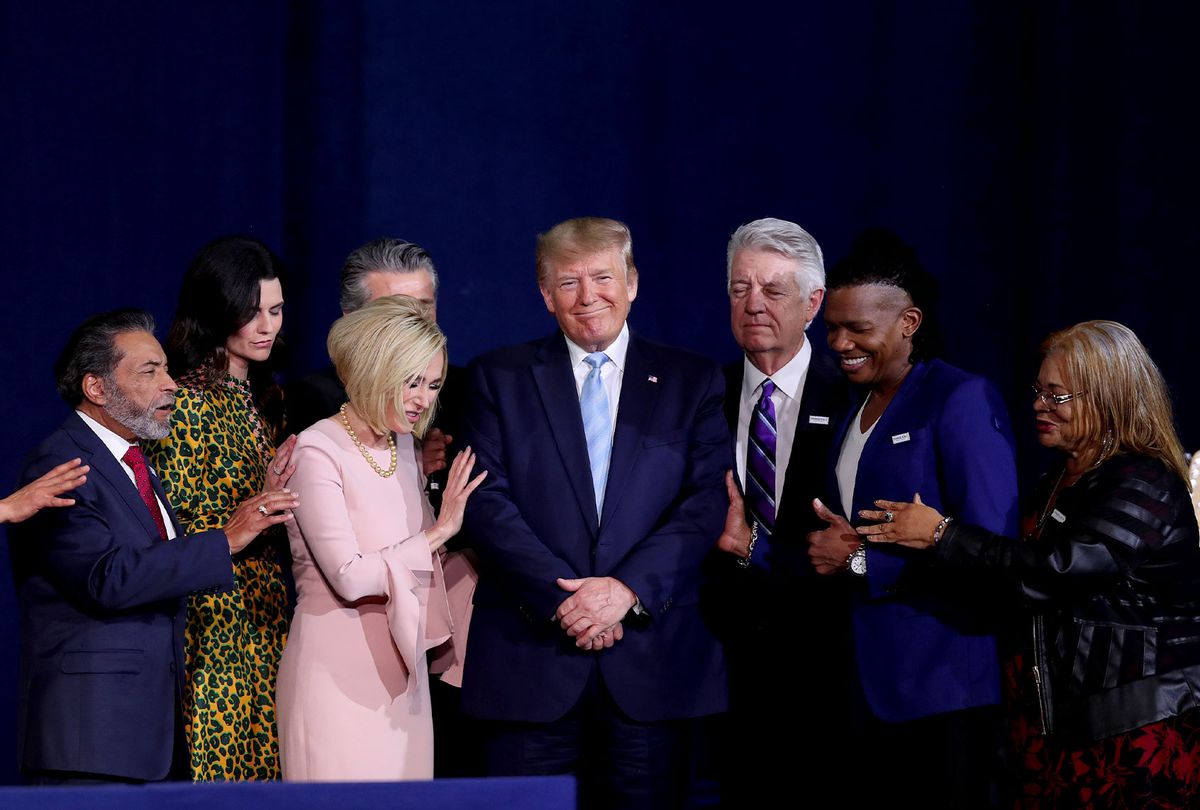Politics is as much about human psychology as about policy or ideology.
- Politics succeeds via simple sound-bites, “feels,” not policies or facts;
- It’s all about perception;
- How what has led evangelical Christians to follow Trump is rooted in racism;
- And how Trump plays off the “religious nostalgia” of white Christians.

OnlySky, Jonathan MS Pearce, 8 Nov 2024: Triumph of the feels, subtitled “Our UK contributor looks at the American disaster with recently acquired humility.”
In 2004, the US made the disastrous decision to re-elect George W. Bush. The UK press and public were almost uniformly aghast. After the election was called, the Guardian’s G2 magazine appeared on newsstands with a solid black front page except for tiny white lettering in the center: Oh, God.
I will admit to some sense of shocked superiority and disdain at the time, here in the UK, for the unthinkable blunder committed by our American cousins.
Twenty years later, a chastened UK looks on as America does it again. After Boris Johnson and Brexit, we know now just how thinkable such a blunder is. Our appalled gaze is tempered with humility. We understand—at least to the limited extent we understand our own disastrous democratic misfire.
Donald Trump lost the election in 2020 largely because of his terrible mismanagement of the COVID pandemic together with a growing desire for voters across the world to be anti-incumbency. At the end of his presidency, he had a job approval rating of 34% and a record-low average of 41%.
Four years later, people’s memories have been massaged by time so that the retrospective job approval rating for his previous tenure has jumped to 50%.
Perception is a funny old thing that doesn’t always jibe with reality.
This fits neatly with the recurring notion that right-wing disinformation is responsible for why so many people have skewed perceptions of reality.
You see, it’s all about the feels. This election was not won on a solid platform of granular policy detail. Trump won on feels. “Make economy good, immigration bad.” Kamala Harris produced an 82-page book to detail her economic agenda. Trump, on the other hand, couldn’t care for details: “I’ll say 100, 200, I’ll say 500— I don’t care!” This was one of his many vague claims about the level of tariffs he would put on all imports into the US. As many have pointed out, showing much more knowledge of basic economic mechanisms, these tariffs would act as a sales tax on US consumers, creating incredible inflationary pressure.
Yet one of the most frequent, mindless comments from his supporters (and bots) during the election was that Harris had no policies.
He appears to have had no desire to exhibit economic knowledge to his voters, let alone be anything but carefree with his declarations. Because the feel here was “Protect America, China bad, make China pay.”
Except China won’t ultimately pay for across-the-board tariffs, the American consumer will.
The writer goes on with many examples of how the media, in podcasts and cable TV and radio talk shows, is dominated by right-wing viewpoints. (Though I’m not sure what’s cause and effect. Maybe because right-wing voters prefer to listen, and not read? This theme has been obvious what with AM radio, for decades.)
Example:
One of the most powerful advertisements that was run around the country to the tune of $95 million of ad spending, carefully targeted at particular demographic sections of the electorate, concerned Democratic support for gender reassignment surgery for immigrants in prison. Check those identitarian boxes. This became a widely discussed hot-button topic that gained huge political traction. The Republicans have learned over the decades, from the War on Christmas to Democrats stealing guns, that the culture wars generate more heat than light, and that irrational heat map guides the way to the ballot box.
How many actual examples are there of the surgery mentioned in the ad?
Two.
I gather these ads were shown during sports broadcasts. I never saw it. The essay concludes:
If Democrats want to win the next election, then they can’t just rely on the anti-incumbency tendency in modern democracies. They certainly can’t merely rely on decent policies, though they would definitely want those too. No, they need narrative for the American people that can be summed up into feels. And they need something to spread those feels far and wide, deep and high. The messages need to be constant, unrelenting even—both loud and subtle.
George Soros, bogeyman of the right wing, himself the victim of torrents of disinformation, knows this—he really does. The liberal philanthropist recently bought a $400 million stake in 227 US radio stations. He’s got a plan, but he shouldn’t be alone. This has to be the strategy of the left and center. Spending hundreds of millions on a last-minute ground game to get out the vote is all good and well, but the serious money needs to be spent much, much earlier. Years and years earlier.
Task 1: Create a narrative, a unifying message for the voters. Task 2: Get it out there.
You don’t really have a message if you are unable to communicate.
The future of American politics lies in the battle over the mechanics of messaging.
\\\
Along the same lines.

The New Republic, Michael Tomasky, 8 Nov 2024: Why Does No One Understand the Real Reason Trump Won?, subtitled “It wasn’t the economy. It wasn’t inflation, or anything else. It was how people perceive those things, which points to one overpowering answer.”
The writer wonders why more people didn’t the threats of Donald Trump potential second term seriously.
Why didn’t a majority of voters see these things? And understanding the answer to that question is how we start to dig out of this tragic mess.
The answer is the right-wing media. Today, the right-wing media—Fox News (and the entire News Corp.), Newsmax, One America News Network, the Sinclair network of radio and TV stations and newspapers, iHeart Media (formerly Clear Channel), the Bott Radio Network (Christian radio), Elon Musk’s X, the huge podcasts like Joe Rogan’s, and much more—sets the news agenda in this country. And they fed their audiences a diet of slanted and distorted information that made it possible for Trump to win.
Let me say that again, in case it got lost: Today, the right-wing media sets the news agenda in this country. Not The New York Times. Not The Washington Post (which bent over backwards to exert no influence when Jeff Bezos pulled the paper’s Harris endorsement). Not CBS, NBC, and ABC. The agenda is set by all the outlets I listed in the above paragraph. Even the mighty New York Times follows in its wake, aping the tone they set disturbingly often.
And on and on, with examples. Concluding:
Contemplate this. If you’re of a certain age, you have a living memory of revolutions in what we used to call the Third World. Question: What’s the first thing every guerilla army, whether of the left or the right, did once they seized the palace? They took over the radio or television station. First. There’s a reason for that.
…
This is a crisis. The Democratic brand is garbage in wide swaths of the country, and this is the reason. Consider this point. In Missouri on Tuesday, voters passed a pro-abortion rights initiative, and another that raised the minimum wage and mandated paid leave. These are all Democratic positions. But as far as electing someone to high office, the Man-Boy Love Party could probably come closer than the Democrats. Trump beat Harris there by 18 points, and Senator Josh Hawley beat Lucas Kunce, who ran a good race and pasted Hawley in their debate, by 14 points.
The reason? The right-wing media. And it’s only growing and growing. And I haven’t even gotten to social media and Tik Tok and the other platforms from which far more people are getting their news these days. The right is way ahead on those fronts too. Liberals must wake up and understand this and do something about it before it’s too late, which it almost is.
\
For me, the crucial question is *why* so many people are willing to believe things that are simply not true. My take is that the stories on right-wing media appeal to their emotions, their prejudices, their biases, and because religion teaches them that you can “believe” anything you want to, that the reality of the world around you doesn’t matter.
\\\
It’s more than that, of course.

LA Times, Randall Balmer, 14 Nov 2024: Opinion: Evangelical Christians’ long road to Donald Trump
We don’t yet know the precise numbers, but it appears once again that four out of five white evangelicals voted for Donald Trump in the presidential election last week.
I’ve said this before: this, as if anything else is needed, completely discredits the evangelical movement. Their supposed Biblical morality is a sham; they just want a strong man to tell them what to do, and to hate the same people they hate. Their behavior is nothing like what Jesus told them to do.
I note this piece because it recounts some history (echoing the summaries in the Prothero book I posted about here) about how the Christian right has changed so dramatically since the 1960s.
In the late 1970s, divorce was considered taboo in evangelical circles, especially divorce and remarriage. Anyone in that category would very likely lose membership in his or her church. Nevertheless, evangelicals, led by Jerry Falwell and other leaders of the religious right, chose to anoint the divorced and remarried Ronald Reagan as their political messiah in 1980. Worse, as governor of California back in 1967, Reagan had signed the most liberal abortion bill in the country, adding to the puzzle.
So why would evangelicals forsake one of their own, Jimmy Carter, a born-again Christian Sunday school teacher and family man, in favor of Reagan?
The answer is not pretty — and it’s the same reason that helps to explain white evangelical support for Trump: racism.
Here is the narrative angle again. Keep retelling the story slightly wrong to credit your side, and people will forget what actually happened.
Contrary to the religious right’s own narrative, white evangelicals did not organize politically in the 1970s in opposition to Roe vs. Wade. The Southern Baptist Convention, in fact, passed a resolution in 1971 calling for the legalization of abortion, a resolution they reaffirmed in 1974 and again in 1976. Evangelicals overwhelmingly considered abortion a Catholic issue throughout the 1970s, and the few evangelicals who commented on the Roe decision applauded it as marking an appropriate distinction between personal morality and public policy.
So what did mobilize evangelicals politically? The catalyst, according to historical records as well as the testimony of such conservative leaders as Paul Weyrich, cofounder of the Moral Majority; Richard Viguerie, Christian right direct-mail king; and Grover Norquist, antitax hound, was the defense of racial segregation at evangelical “segregation academies” and institutions, including Bob Jones University in South Carolina.
Again, this synchs with Prothero’s account. Racism drove the religious right; abortion was an issue picked up along the way.
\\\
Further evidence. Look at Trump’s smirk. He’s played them all!

Salon, Chauncey DeVega, 15 Nov 2024: The ultimate answer to why Donald Trump won: White Christians, subtitled “The ‘religious nostalgia’ that unites White Christians under Trump has propelled his rise since the beginning”
The piece is an interview with subject matter experts. I’ll just quote a bit that is echoed in the article’s title.
The biggest thing mainstream analysis refuses to comprehend is the continued power of a politics of racial grievance and religious nostalgia among white Christian Americans. Many pundits thought that a candidate who ran the most racist campaign since George Wallace in 1968 couldn’t possibly move above a ceiling that would keep them far short of a majority. But in this election, most people who consider themselves to be good white Christians flatly declared that white supremacy was, at a minimum, not a deal breaker for them. As has been the case every time Trump has run, eight in ten white evangelicals cast their vote for him, as did six in ten white Catholics and six in ten white non-evangelical Protestants. By contrast, 86% of Black protestants voted for Harris.
And:
The answer to the question on so many Americans’ lips — “How did we get here?” — is straightforward. That answer won’t be found in the margins of which group shifted toward Trump between 2020 and 2024. It is right in front of us. White evangelical Protestants, along with other conservative white Christians, were the principal actors who baptized, defended, rehabilitated and sustained Trump’s candidacy. More than any other group, these white Christians, who once proudly called themselves “values voters,” have provided moral and religious cover for the immoral and the profane.
Again, discredited. Hypocritical.





